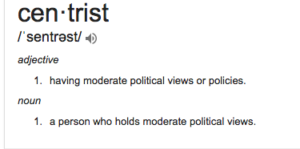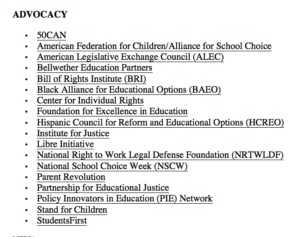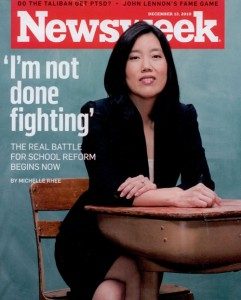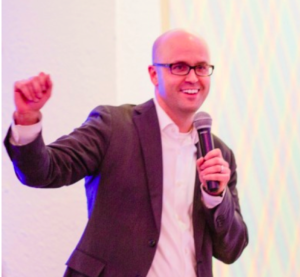“How the Democratic Party Became an Enemy of Public Education” explained how both Republicans and Democrats are selling the idea that private-sector education reforms have the best interests of all our children at heart. They don’t.
Advocates for private entities controlling the public schools have completely ignored facts, research, and us. The consequences their policies have on our schools, communities, and children are harmful. The leaders of this private-sector education revolution know what they are doing. And they don’t care about the harm being done. They aren’t accountable to any of us.
And never forget, both Republican and Democratic leadership have no faith in the idea that We, the People, have enough brainpower and manpower to fix our own problems, in our own schools. Those in power trust Washington D.C.’s think tanks and education industry corporations to come up with “innovative” education reforms to sell to us.
Bull roar. These influential people pushing the levers of power are destroying our public education system. Their latest innovation? The claim to be proposing “progressive” or “centrist” education reforms for the Democratic Party. The truth; their agenda is neither. And they are paying the “grassroots” to advocate for them. It’s being done through confusion, propaganda, and indoctrination.
Progressivism supports making progress towards solving social problems.
Progressives advocate for the best solutions based on the latest information.
Progressives expect the political system to respect the scientific method of problem solving.
Progressivism is hard to define because progressive principles change based on evidence.
Important to discussing this further are the following points from “How the Democratic Party Became an Enemy of Public Education”:
- President Clinton focused on “education and the economy,” and put standardized testing and federal money for charter schools into federal law.
- Billionaire Eli Broad supported the Clinton’s agenda.
- Bruce Reed, co-founder of the (“centrist”) Democratic Leadership Council, was advisor on education policy for Presidents Clinton and Obama before becoming the head of the Broad Foundation education efforts.
Here’s where the story really picks up steam.
After George W.’s election, the Democratic Party felt the need to seek a stronger focus and more money. At that time, the view of Democrats was…
“They don’t put big corporate America first.” LINDA NECOCHEA
And…
“the Republicans, on the other hand, seem to favor big business.” JUNE BRINES
Meanwhile, key Democrats complained.
”We don’t have the money [to compete with the Republican Party].”
Al From and Bruce Reed of the Democratic Leadership Council stepped in to redefine the Democratic Party. They had help.
An ally of Mr. From and Mr. Reed, Will Marshall, leader of the Progressive Policy Institute (think tank), said the party must…
”show that we can make progressive government work.”
The Democratic Party leaders went with the Clinton mantra to — ”develop a strong economic message.” Message. Not strong policy for the middle-class. Message. We got messaged.
Democratic Party leadership went after the money. In the process, they played politics with our lives, just like the other party. The people have been wronged— from both sides of the aisle.
Democratic leadership sold their souls….or more accurately, they sold our children’s neighborhood public schools. The policy pushers?
The Progressive Policy Institute …
“a Democratic Party-aligned policy shop that promotes…“market-friendly” economic policies. It claims to advocate “a philosophy that adapts the progressive tradition in American politics to the realities of the information age.”
Progressive tradition? The realities of The Information Age? What? The age when we no longer trust any information without first following the money? And, the money flows to both “sides.” In a money-driven system, R or D doesn’t matter.

Every organization on this list is an enemy of public education. Their actions speak of standardization, privatization, and they are dismantling the public education system under the guise of “reform.”
What is important is knowing the main players in private-sector education reforms.
That’s how you know the enemy, by the company they keep.
Unfortunately what started with single individual enemies of public education became multiple well-funded armies of advocates.
“We outline the many overlapping connections in this echo chamber of advocacy groups, think tanks, and media outlets that are increasingly funded by a handful of conservative [and neo-liberal] billionaires and for-profit education companies — often without proper disclosure. These groups are driving the education privatization movement forward by co-opting the education reform mantle.
And no story about the battle over education reform would be complete without this out-sized, outspoken enemy of public education — former D.C. Chancellor Michelle Rhee.
Knowledge of the funding for her organization, StudentsFirst, was under wraps for a long time. Why is $he important?
“At long last, Michelle Rhee’s funders revealed.” Rhee “received $500,000 [half a mil!] in startup funding from philanthropists Eli and Edythe Broad’s Broad Foundation….”
Oh, the Billionaires Boy’s Club. Broad is connected to Rhee. And the replacement for Rhee at StudentsFirst, Jim Blew, previously (still?) worked for the Walton (Walmart) Family Foundation. Now, StudentsFirst has merged with 50CAN. Blew explains the arrangement,…
“50Can is stronger in advocacy.”
The plan is set. 50CAN is hiring. And just to clarify how this all works…
Blew said, “We need to always assure our donors that we’re using their money as effectively as possible. We’re completely dependent on these donors.”
So the man in charge of 50CAN is Marc Porter Magee. He’s connected every which way. It’s an all-in-the-family deal with his wife, Common Core proponent, Kathleen Porter Magee, and brother Michael Magee, CEO of the non-profit Chiefs for Change.
Brother Michael Magee sees
“turnover in education leadership is a problem” [he] hopes to address in his new role.”
That should be easy enough with Eli Broad (through Bruce Reed) already in the leadership building business.
Win, win —for them. What about us — the public?
Marc Magee’s 50CAN organization will be training advocates to push their agenda for education reform throughout our nation. How important is this? That’s for you to decide.
This is what the education gadfly reported.
Marc Magee “cut his teeth doing D.C.-based think-tank work.” The think-tank?
“Progressive Policy Institute, the think tank that tried to create policies for the ‘new’ Democratic Party.”
And Magee had plenty to say for himself. He spoke of…
“the real problem we need to solve. It’s not that our urban schools and traditional districts are ‘failing.’ It’s that our traditional approach to education plateaued around the 1970s, and we’ve struggled to make meaningful progress since then.”
——–THAT IS A LIE. A distortion of facts. Our public education system was on a steady trend of improvement with a significant narrowing of the achievement gap that extended well into the 1980’s. THEN political leaders became the drivers of education “reforms.” THAT is when dissatisfaction with public schools began trending up (along with the cost$). They used us!
The truth? None of the private-sector education reforms —not standards, assessments, accountability, technology, charters, or vouchers —were ever based on facts. It was all about the information age, the knowledge economy; it was all about the money. It was never about all “our” children.
The enemies of the public education system aren’t reforming schools; they are dividing and destroying. They aren’t looking for a centrist position. They aren’t making progress on education reform. They don’t even accurately define the problem.




R
Is this really a partisan problem? Should “public education” (which I believe is a necessary prerequisite of a developed society, that should be protected and improved) be discussed in terms of “Democrat” or “Republican” principles??? We are not sufficiently discussing why our public school system has problems. As long as we feel about taxes the way we do, and then base the school system’s funding on property taxes (who in the world came up with that), the U.S. Public school system will have serious problems! Can we start discussing the causes, please???
That would be great! I would love to discuss not only the real problems (issues/causes) but also some of the experience-based and research-based solutions.
I have yet to find somewhere for that discussion to happen. I’ve been put on school committees of various kinds but felt more like it was so administrators could comply with some “participation” or “engagement” requirement than to actually do problem solving.
Unfortunately, until we stop what politics has done to the system, we will struggle especially with the funding. I really do appreciate your comment because it has me thinking about taking the funding approach as “the” priority rather than all the other things that divide us. Yes, the whole local property tax supporting inequality in education is a root cause of our fight.
Thank you and let me know if you find any place for that discussion that I can join.
Education is the next big cash cow that corporation vultures are eager to exploit, and just like healthcare and privatized prisons, the result will be disastrous.
Yes, I’m still hoping we don’t allow the disaster to happen. 🙁
Where are your pros for public education?
Bringing out the cons of an opposing view does not educate those who have not yet formed an opinion.
The biggest pro for our public education began with President Lincoln. Following his example of passing legislation that effectively and efficiently set in motion a system of practical education responsive to the needs Of the People id “how” we get back on track. https://thecrucialvoice.com/2013/08/07/how/ The land-grant system is the model that the original 1965 Elementary and Secondary Education was based upon. It was to be a cooperative (fed, state, local) and based upon research laboratories (like the extension systems research stations).
I’m totally with you on the idea of providing information upon which people make their own informed decisions. https://thecrucialvoice.com/2015/06/15/informed-citizens/ It’s not like I haven’t tried that approach. I gave up my day job for a while just to write a book that tries to put forth solutions and asks the reader to think about which solutions work best. People don’t want to read a whole book.
But I will certainly take your comment to heart and work on improving my website as a source of information. I can only do so in my spare time since I don’t get paid for my efforts. If you know anyone willing to volunteer to help organize this site, please send them my way.
I’m also available to answer any questions specifically about either the pro’s or con’s on any subject presented on this site and provide my sources. victoriamyoung1@gmail.com
Hmmm… I iive in a very wealthy suburb in the SF Bay Area. Obviously we have great schools. It’s socio-economic. Oakland needs charter schools. Southeast section of San Francisco needs charter schools. All in for Betsy DeVos on this one. The peeps that the charter school the most are those that need them the most.
What the peeps need are an assurance of quality learning opportunities for all students. Charters fail to provide that type of assurance (only 17% perform better than regular public schools). Charters are spending more on transportation and advertising. And the “need” for them has not been documented.
I’m proud to have taught my children the difference between a “need” and a “want.”
I see a need for school choice in isolated circumstance and based on an individual “needs” basis. We have been offering those opportunities within the public system (magnet schools & alternative schools). I now am beginning to hear the taxpayer backlash about paying for charters just because a small group decides they want them.